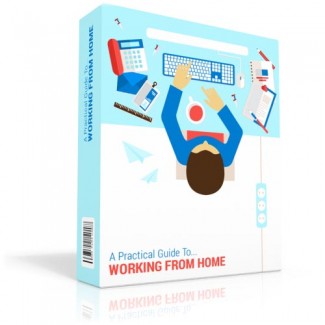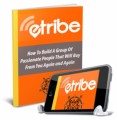 License Type: Personal Use
License Type: Personal Use  File Size: 4,961 KB
File Size: 4,961 KB File Type: ZIP
File Type: ZIP
 SKU: 53990
SKU: 53990  Shipping: Online Download
Shipping: Online Download
Ebook Sample Content Preview:
There is a multitude of software out there designed to make working easier and more efficient. In this chapter we'll go over some of the most widely praised programs, some free and some paid, that can help you boost your productivity and make working from home a breeze.
Instant Communication: Skype
In the last few years, Skype has become to #1 instant communication tool for online workers. Whether you prefer instant messaging, phone calls or video chat, Skype offers it all for free (or, in some situations, for a low fee). It's available for most platforms, and you can even take it with you in your phone or tablet.
Office Suite: Microsoft Office (or similar)
There's no way around it: if you're going to work from home you need an office suite. Microsoft Office remains industry standard, but there are lots of alternatives available if you're feeling experimental. There are cloud-based solutions like Google Docs (free) as well as locally installed software such as Open Office (free) and Apple Productivity Apps/iWork (commercial). All of the alternatives are file-format compatible with Microsoft Office, but not all formatting features are supported by them.
Cloud Storage: Dropbox
Dropbox is cloud-based storage that lets you store your work files online and reach them wherever you are. You can install it on all your computers, phones and tablets, ensuring your important documents are always with you (assuming you have an Internet connection at least sporadically so it can sync). It's also great when you're collaborating with others, as you can share folders and files with them and see whenever a file is changed.
Project Management: Basecamp
There's no shortage of great project management tools on the web, but Basecamp is perhaps the most well known of the bunch. It's designed to be fast loading and simple to use, and the clean, clutter-free interface is held in high regard by many. Keep in mind though that the simplicity and ease of use comes at a price: Basecamp doesn't have as many features as some of the more advanced project management systems.
If you don't like Basecamp, give Asana a go - it's becoming more and more popular and has some features that Basecamp lacks.
To-do List: Wunderlist
There might actually be even more to-do list services than project management services out there. It's a popular service to build apparently, most likely because it's a deceptively simple idea. It's not easy to get it exactly right though, and there are many poor implementations out there. Wunderlist is one of the best, with pleasing aesthetics and all the functionality you could ask for. It's also free to use, and multiplatform so you can use it on all your devices.
(Bonus tip: Some people actually find it better to use a plain old pen & paper for to-do lists. If you've tried software and online services but can't seem to stick with any of them, give the old-fashioned method a go!)
Time Tracking: Toggl
Whatever your profession is, you may sooner or later find yourself requiring time tracking of some kind. Some project management tools have it built-in, but if you prefer a light-weight, standalone alternative you should check out Toggl. It doesn't get any easier to use, and in many situations it's completely free to use.
Time Management: RescueTime
If you find yourself easily distracted while working, or just want to see how you really spend all those hours in front of the computer, check out RescueTime. It lets you track everything you do on your computer, and create reports showing exactly how you spend your time. This can be a real wake-up call!
Block Unproductive Websites: LeechBlock
LeechBlock is a browser add-on for Chrome and Firefox that lets you block time-wasting websites during working hours. If you regularly find yourself wasting time on Facebook and Youtube when you really should be working, installing a tool like that can really help you become more productive. Keep in mind though that you will need at least some willpower to ensure you don't just disable it when you feel your Facebook addiction calling!
Note Taking/Management: Evernote
If your computer is overflowing with notes and documents that "could be useful someday", you may want to check out Evernote. It lets you store all the little bits and pieces of information you collect throughout your day in an easily searched repository. You'll have everything in the same place, accessible from all your devices. This is especially useful for information hoarders, but most of us are probably guilty of not organizing our documents in the best way.
Dictation: Dragon NaturallySpeaking
For those who spend much of their day typing, it may be worth checking out Dragon NaturallySpeaking. Many people find dictating much faster and easier than typing things out, meaning productivity will increase with a tool like this. It's also great if you're suffering from carpal tunnel syndrome or anything else that prevents you from working long hours on a keyboard. It may not be the best choice if you're not a native English speaker though, as it requires good pronunciation to work as intended.
Cloud Accounting/lnvoicing: Freshbooks
Financial software is rarely easy to use, but Freshbooks is a notable exception. It's perhaps the most popular solution for simple accounting and invoicing today, and it's quite affordable too. Unless your business has very specific requirements and need an advanced accounting solution, Freshbooks will most likely be more than enough.
Password Management: LastPass
You probably already know that you should have a unique password on every website you have an account with. The question is, how on earth are you supposed to keep track of all these passwords? Easy! Use a password manager like LastPass. With a tool like this, all your passwords will be stored in an encrypted database accessible through one single master password. It's very convenient, secure and it works on most platforms. If you prefer a noncommercial solution and hosting your password database yourself, check out KeePass which is a decent alternative.
- File Size:4,961 KB
- License: Personal Use
- Category:Ebooks
- Tags:2015 Ebooks Personal Use








